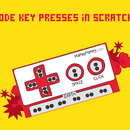Introduction: Makey Makey and Micro:bit Power Glove
Grab your Inventor Booster Kit or conductive tape, rifle through your winter clothes to find a mismatched glove and give it a new purpose! Let's prepare your microcontrollers!
Supplies
- Makey Makey
- micro:bit
- Scratch Account
- Inventor Booster Kit
- Lost and Found Glove
Step 1:
Prepare micro:bit to use with Scratch
- Connect micro:bit to Scratch (Follow directions here)
- Download Scratch Link
- Download Scratch micro:bit Hex File to your micro:bit
- Add Makey Makey and micro:bit extensions to your new Scratch project.
Step 2: Baste Micro:bit to Glove
Make sure micro:bit is unplugged from the battery. Using some regular thread, baste (which means loosely stitch) micro:bit to the glove. You can use the holes along the edge connector to sew through your micro:bit and stitch across the controller to hold it onto the glove. When you are done, tie a knot and cut the thread.
Step 3: Plug in Battery and Test With Scratch
Now that micro:bit is securely fastened to the glove, plug in the battery and tuck the battery pack into your glove. Create your code on Scratch and test your glove!
Try a quick code to make sure it is connecting well with Scratch.
Step 4: Make Conductive Fingertips With Conductive Fabric Tape
To connect your Makey Makey, use conductive fabric tape to create an EARTH strip along the base of the glove. Then place a separate piece of conductive tape on each finger tip. At the knuckle side of the glove, you can fold the tape onto itself to create a clippable spot for each alligator clip.
Step 5: Connect Makey Makey
Connect an alligator clip to each knuckle! We used a rubber band to keep all of the alligator clips in place. Clip EARTH to the strip on the heal of the glove.
Step 6: Code and Play!
Now that you are all wired up, code your glove and have fun!
Our Scratch code changes the background to a random when you tilt the micro:bit AND press the down arrow.
This is a riff of the Scratch Theramin code from this micro:bit tutorial.
See our full Scratch Code here.






